

Theme: Future Ready. Led by the Cable Impacts Foundation (www.ncta.com/cableimpacts) This page provides an overview of the theme and invites your participation.
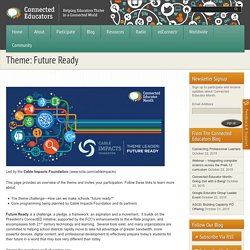
Follow these links to learn more about: The theme challenge—How can we make schools “future ready?” The Characteristics Of A Good School. The Characteristics Of A Good School by Terry Heick For professional development around this idea or others you read about on TeachThought, contact us.
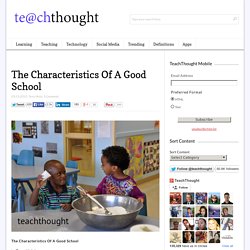
When a society changes, so then must its tools. Many political reforms are ‘low impact distractions’ Many popular political initiatives – such as performance-related pay and creating new types of school – are expensive distractions that have a low impact on educational outcomes, it is claimed.
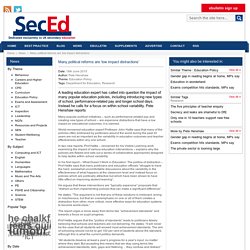
World-renowned education expert Professor John Hattie says that many of the policies often embraced by politicians around the world during the past 20 years are not as important as the variability in education outcomes and teacher effectiveness within any one school. In two new reports, Prof Hattie – renowned for his Visible Learning work examining the impact of various education interventions – explains why the policies are flawed and sets out a series of collaborative approaches designed to help tackle within school variability. Shadowing Leadership for CPD by. This is a blog about developing middle leaders to become future senior leaders.
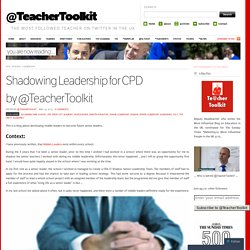
Context: I have previously written, that Hidden Leaders exist within every school. During the 8 years that I’ve been a senior leader, prior to this time I wished I had worked in a school where there was an opportunity for me to shadow the senior teachers I worked with during my middle leadership. Unfortunately this never happened … and I left to grasp the opportunity first hand. Developing Resilience and Wellbeing by @TeacherToolkit #Phew. This is a blog about developing your own resilience and teacher well-being.
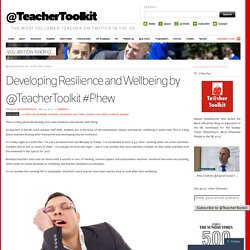
As teachers in the UK reach another half-term, students are in the thick of the examination season and teacher wellbeing is wafer-thin! This is a blog about teachers looking after themselves and developing teacher resilience. Thirty-words-30-seconds-by-teachertoolkit-v2. The Benefits of Parent Involvement: What Research Has to Say. Classroom Flexibility at WAB. If I was interviewing for teaching staff…
Recently I was chatting to a principal about what we would look for in potential staff members if we had the opportunity to build a school from scratch.
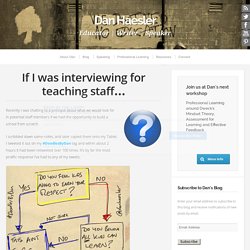
I scribbled down some notes, and later copied them onto my Tablet. I tweeted it out on my #DoodlesByDan tag and within about 2 hours it had been retweeted over 100 times. It’s by far the most prolific response I’ve had to any of my tweets. I thought I’d share the scribblings here with some further thinking around it. 1. 2. 3. 4. And that is a key word – Team. Can Schools Create a Culture of Learning By Doing? - Education. What if we had a culture of "do" instead of a culture of "know" in our schools?
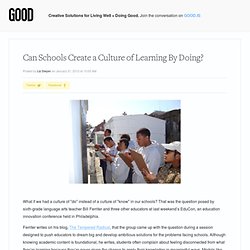
That was the question posed by sixth-grade language arts teacher Bill Ferriter and three other educators at last weekend’s EduCon, an education innovation conference held in Philadelphia. Ferriter writes on his blog, The Tempered Radical, that the group came up with the question during a session designed to push educators to dream big and develop ambitious solutions for the problems facing schools.
Although knowing academic content is foundational, he writes, students often complain about feeling disconnected from what they’re learning because they’re never given the chance to apply their knowledge in meaningful ways. Models like service learning are proven to boost student engagement and reduce the dropout rate, yet the test-heavy school culture has created an environment where teachers simply cover the curriculum and students regurgitate facts onto a test.
Photo via (cc) Flickr user Mark Gstohl. 3 Things That Have Slowed the Change Process Down in Education (And What We Can Do About It) There has been a lot of talk on the idea that education as a whole takes a long time to change.
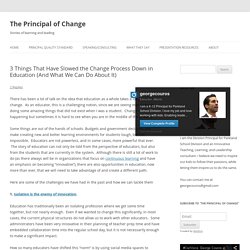
As an educator, this is a challenging notion, since we are seeing many people doing some amazing things that did not exist when I was a student. Change is happening but sometimes it is hard to see when you are in the middle of the process. Some things are out of the hands of schools. Budgets and government decisions can make creating new and better learning environments for students tough, but not impossible. Educators are not powerless, and in some cases, more powerful that ever.
Here are some of the challenges we have had in the past and how we can tackle them 1. Education has traditionally been an isolating profession where we get some time together, but not nearly enough. We need to make this happen and create transparency in our own classrooms. How does a song like “Gangnam Style” go so viral that most people around the world not only know the words but the dance moves?
Make it go viral. To Advance Education, We Must First Reimagine Society. Why haven’t education reform efforts amounted to much?
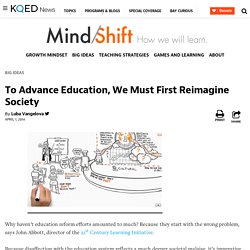
Because they start with the wrong problem, says John Abbott, director of the 21st Century Learning Initiative. Because disaffection with the education system reflects a much deeper societal malaise, it’s imperative that we first figure out what kind of world we really want: a world populated by responsible adults who thrive on interdependence and community, or a world of “customers” who feel dependent on products, services, and authority figures, and don’t take full responsibility for their actions?
The answer, he says, will point to the changes needed in all three pillars of education — schools, families, and communities. As Abbott sees it, the need for reflection has never been greater. Spurred by technological advances, “civilization is on the cusp of a metamorphosis,” he says, that will lead either to societal collapse and chaos, or to a resurgence of liberty, community, and ethics.